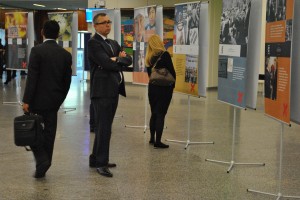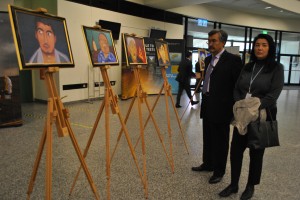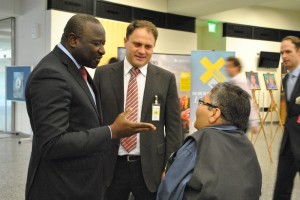
(L-R) Dr. Lassina Zerbo, Roman Vassilenko and Karipbek Kuyukov talk at the event at CTBTO in Vienna on Oct. 28.
VIENNA, Nov. 1 – Karipbek Kuyukov, the famous artist and Honorary Ambassador of the ATOM Project brought this simple message with him on a recent visit to Austria: “If you want peace, prepare for peace, prepare for it with all your efforts, each day of your life, each hour of your day”. Such a message resonated well in numerous interactions Mr. Kuyukov and his fellow campaigners had during the five days packed with meetings, exhibitions and presentations.
As central Europe was enjoying the last few warm and sunny days of the fall, Mr. Kuyukov and his colleagues at the ATOM Project arrived in Vienna to promote this international campaign seeking to achieve the permanent ban to nuclear tests, ensure the entry into force of the Comprehensive Nuclear Test Ban Treaty (CTBT) and eventually eradicate nuclear weapons. And they received an equally warm welcome and support.
Mr. Kuyukov, who was born armless because of the effects of radiation on his parents who lived near the former Semipalatinsk nuclear test site in eastern Kazakhstan but who became a famed artist nevertheless, shared his message in speeches to the audience at the Vienna-based Comprehensive Nuclear Test Ban Treaty Organization’s (CTBTO) preparatory commission on Oct. 28. He followed up on it in meetings with Kazakh students in Austria and with international students and faculty at the University of Applied Sciences in a historic town of Krems later in the week.
The ATOM Project, launched by Kazakhstan President Nursultan Nazarbayev in 2012, brought two exhibitions to Austria. One exhibition called “A Lesson in Peace” includes photos and documents depicting the legacy of Soviet nuclear weapons testing in Kazakhstan from 1949 to 1991 and the history of an independent nation’s freeing itself from the nuclear weapons legacy after independence in 1991.
The other exhibition called “Looking for Peace” includes about two dozen paintings by Mr. Kuyukov and reinforces in a unique way his simple yet powerful oral messages. Both were presented to nuclear experts, ambassadors, diplomats and other visitors including the UN staff in Vienna at the offices of the Comprehensive Nuclear-Test-Ban Treaty Organization (CTBTO).
The organization’s Executive Secretary, Dr. Lassina Zerbo, spoke at the event on Oct. 28, drawing the attention to the importance of the early entry into force of the CTBT, and emphasizing Kazakhstan’s contribution to advancing the ideas of nuclear non-proliferation and a world free of nuclear weapons.
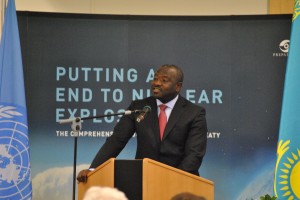
Dr. Lassina Zerbo, Executive Secretary of CTBTO, leads the organization’s efforts towards the entry into force of the key treaty.
“Nearly two decades after President Nazarbayev’s bold step to close the Semipalatinsk test site, there are those who still question that nuclear testing does not make any one safer. On the contrary, it threatens peace, security and sustainable development,” Dr. Zerbo said at the exhibitions’ launch which took place on the margins of the CTBTO main annual gathering.
“Human suffering of victims exposed to radiation, the environmental degradation, and economic loss should never be forgotten,” Dr. Zerbo added. “The ATOM Project is an expression of the strength of the people of Kazakhstan: in suffering, they found determination; in despair, they found awareness; in tragedy, they found firm conviction of a better world. While telling the stories of the survivors of nuclear tests, the ATOM Project creates awareness of the human and environmental cost of nuclear testing, and acts as a strong voice for millions of citizens all over the world united in their desire to stop nuclear testing forever and to choose a different future… Now is the time for the eight states whose ratification of the CTBT will bring it into force to show the political will and fully endorse it.”
Since its opening for signature at the United Nations in 1996, CTBT has been signed by 183 countries, and ratified by 161. In order for it to enter into force, however, it requires the signature and ratification by at least another eight countries listed in the Annex II to the Treaty: China, Egypt, India, Iran, Israel, the DPRK, Pakistan, and the United States.
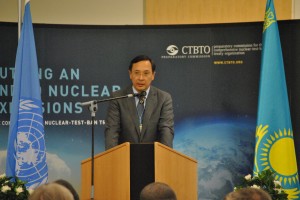
Ambassador Kairat Abdrakhmanov noted that the decision made 22 years ago by President Nazarbayev and the newly-independent country to close the Semipalatinsk Nuclear Test Site and renounce the nuclear arsenal it had inherited from the Soviet Union demonstrated to the international community that it was possible to voluntarily renounce nuclear weapons by the will of the people.
In his speech at the event, Kazakhstan’s Ambassador to Austria and Permanent Representative to the International Organizations in Vienna Kairat Abdrakhmanov spoke of his country’s initiatives in non-proliferation and nuclear disarmament, noting that today it firmly believes in the need for the international community to take further decisive actions to address the global nuclear threat. He also noted that the decision made 22 years ago by President Nazarbayev and the newly-independent country to close the Semipalatinsk Nuclear Test Site and renounce the nuclear arsenal it had inherited from the Soviet Union demonstrated to the international community that it was possible to voluntarily renounce nuclear weapons by the will of the people.
Roman Vassilenko, Ambassador-at-Large at Kazakhstan’s Ministry of Foreign Affairs, also spoke at the event elaborating on the history of Kazakhstan’s disarmament and disposal of Soviet nuclear weapons and noting the country’s principal and unconditional decision to waive potential membership in the club of nuclear weapon states.
He then presented the ATOM Project to event attendees, and said: “We have seen unwavering support for the ATOM Project, both in our country and internationally. Already, people from more than 100 countries have signed the online petition [calling for the entry into force of CTBT]. But we can and must achieve greater results, and we will continue our efforts in earnest. And we will continue calling on all people of good will to support the АТОМ Project and make the realization of a nuclear-weapons-free world our primary objective.”
In his remarks to the audience, Mr. Kuyukov once again reminded them of the tragic consequences of nuclear testing and urged those present to support the efforts to achieve a final and irrevocable ban on nuclear testing, including through the entry into force of the CTBT.
The Austrian trip for the ATOM Project did not end there. On Oct. 30, the Kazakhstan Student Society in Austria (KSSA) met Mr. Kuyukov and his colleagues at the country’s embassy in Austria. After the meeting, the organization’s leaders said they were eager to help spread the news about the project among their peers.
There are about 300 Kazakh students currently studying in Austria, and their group leaders were keen on meeting their fellow countrymen promoting the ATOM project.
A five-minute ATOM Project documentary was also shown to the students portraying the heavy consequences of nuclear tests conducted over four decades on the territory of Kazakhstan that impacted 1.5 million lives and more generations to come.
“I think the idea [of The ATOM Project] is very important as it receives positive feedback in Austria,” said Nursultan Akhmediya, a political science major at the University of Vienna and the KSSA deputy treasurer. He went on to share his ideas about what other means could aid the project to spread its message by stating that common people should be made more aware of the nuclear test consequences.
“We could do more work with the regular population. I mean in Kazakhstan not many people know about this project as meetings are held at high levels and the average people don’t know about what is being done and how it is dealt with,” Akhmediya underscored. “The painting that struck me the most was the ‘First Explosion’,” Akhmediya said. “I was surprised by Karipbek Kuyukov’s talent, how he could express all this pain in one painting, and, considering that in those days people were not informed about nuclear tests, he still managed to do it successfully.”
“I came here today to hear the story Karipbek Kuyukov has to tell,” said Nurgul Kereyeva, another University of Vienna student and a physics major.
“I have heard of him before, but wanted to hear with my own ears about the fates of nuclear test victims in our country,” Ms. Kereyeva said. “His most recent portrait of the victim really moved me. I noticed a tear drop in his right eye. It is subtle and profound indeed. I am proud that my country had started this project as Kazakhstan is still developing. But we showed a good example to more developed countries like Japan, the U.S., Germany and it was a big step for us. There is a phrase I heard Karipbek say once – ‘I stand tall on my feet and hold my life with my teeth’. I really admire this man.”
Kuyukov shared his life story with the students, and the students presented him a T-shirt with the KSSA logo to conclude the meeting.
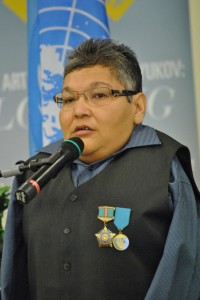
Karipbek Kuyukov, Honorary Ambassador of The ATOM Project, has urged global leaders to show courage and make decisive steps towards nuclear disarmament.
“Most students had classes in the morning,” Akhmediya added, but many still managed to show up. “I think it is because people feel he has a big heart despite the consequences of the nuclear tests. And I wish him to continue the mission and that all the set goals of The ATOM Project would be accomplished.”
When Mr. Kuyukov and the other delegates from Kazakhstan arrived to meet students and faculty of the IMC University of Applied Sciences in Krems on Oct. 31, they found an equally enthusiastic response to their calls for more vigorous public engagement with the global leaders on nuclear disarmament.
“Today’s exhibition marks another opportunity for Kazakhstan to increase awareness, especially among the young generation – tomorrow’s leaders, thinkers, and doers – of the need to stop nuclear testing, globally and permanently,” Ambassador Abdrakhmanov told the students. “This is why President Nazarbayev launched a new initiative in the nuclear disarmament and non-proliferation sphere, the ATOM Project, on August 29, 2012.” The Ambassador further described Kazakhstan’s consistent steps in this sphere, urging the audience to take an active civic stance and pursue actions.
In turn, Mr. Vassilenko explained the efforts under the ATOM Project, noted the already broad international support it received and called for more efforts by the youth to push for progress in nuclear disarmament.
“The sooner the nations and the leaders of the world return to the basic principles of human relations that are defined by trust, mutual understanding, tolerance and goodwill, the better chances we will have of building a safer world, free from the threat of nuclear annihilation,” he added.
Mr. Kuyukov once again reminded the audience of the tragic consequences of nuclear tests, and urged those present to support the ATOM Project: “I would like for my generation to be the last to suffer from the effects of nuclear weapons. And so I urge you to learn more about this tragic story, to tell about it to all your friends and acquaintances and to make building a world with clean air and clear future our common cause.”
Such messages resonated well with the participants of the gathering.
“Kazakhstan has shown an example of a responsible policy to other countries. Today we have listened to this lesson in peace and I am sure many of our students will want to support this initiative and spread its peacemaking message,” University President Dr. Heinz Boyer said.
“I think many people now would think about this issue a lot more,” Elena Korotnikova, a student at the University, said. “Paintings [by Mr. Kuyukov] are awesome, especially given the way they were drawn. I believe this should inspire people for similar actions.”
The meeting ended with the signing of the ATOM Project’s online petition by students and professors who also expressed intention to talk about the initiative to their friends, including through social networks.
This year, with the support of relevant organizations and Kazakhstan’s missions abroad, the ATOM Project already organized events at the United Nations in New York, as well as at various think tanks and universities in Moscow, Washington and locations in European countries. On Aug. 29, the UN International Day against Nuclear Tests, it staged a global minute of silence to commemorate victims of the nuclear weapons tests globally. And later in November, the ATOM Project will travel to Japan to jointly participate in events with a local anti-nuclear weapons campaign, A Picture Book without Pictures, in Tokyo, Hiroshima and Nagasaki.